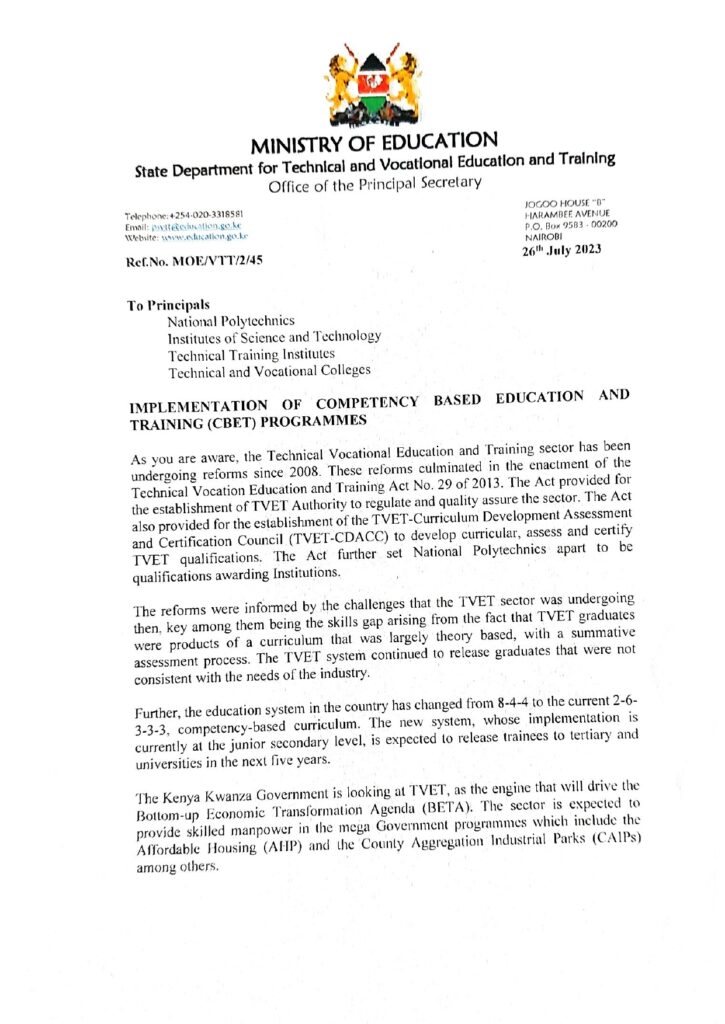Share this post:

In a significant move aimed at transforming the Technical Vocational Education and Training (TVET) sector, the Principal Secretary of TVET, Dr. Esther Thaara Muoria, has issued a directive for all new admissions to TVET colleges to be exclusively for Competency Based Education and Training (CBET) courses, with the directive taking effect immediately. Consequently, admission into Kenya National Examinations Council (KNEC) tested courses will be stopped.
While the government aims to bridge the skills gap and produce industry-ready professionals with the shift to a competency-based 2-6-3-3-3 curriculum, concerns have been raised regarding the readiness of trainers and equipment to fully implement CBET courses.
One critical question surrounding this directive is whether the trainers and instructors in TVET colleges are adequately prepared to deliver CBET courses effectively. The competency-based approach requires a different pedagogical approach, emphasizing practical training and real-world applications. It demands a shift from traditional lecture-style teaching to hands-on, experiential learning, which may require additional training and support for educators.
Additionally, there are concerns about the availability and suitability of equipment and facilities in TVET colleges. To effectively deliver CBET courses, it is crucial that institutions have modern, well-equipped workshops and labs that mirror industry settings. This raises questions about the current state of infrastructure and the financial resources required to upgrade and maintain these facilities.
The decision to stop admission into KNEC tested courses is seen as a consequential step in aligning the TVET sector with the competency-based curriculum. KNEC tested courses have been a traditional feature of TVET education, but their discontinuation signals a significant shift towards prioritizing practical skills and industry relevance over traditional examination-based assessment.
While the government sees TVET as a driving force behind the Bottom-up Economic Transformation Agenda (BETA) and anticipates that CBET will provide skilled manpower for various government programs, some stakeholders worry that rushing into exclusive admissions for CBET courses may lead to hasty implementation, potentially compromising the quality of education.
The successful implementation of CBET courses also depends on collaboration between the State Department, National Polytechnics, and TVET-CDACC. These entities play crucial roles in developing, assessing, and certifying TVET qualifications. Any challenges or coordination issues among them could hinder the smooth transition to a fully competency-based system.
As the government pushes forward with this ambitious and transformative education agenda, it is essential to address these concerns and ensure that all stakeholders in the TVET sector are adequately prepared to embrace the shift to CBET. A measured and well-planned approach that takes into account the readiness of trainers, facilities, and collaboration between relevant bodies will be key to realizing the potential benefits of CBET in enhancing the skills and employability of TVET graduates.
In conclusion, the decision to exclusively admit students into CBET courses in TVET colleges signals a significant shift in the education landscape. However, the apparent haste with which the directive has been issued has left doubts about the sector’s readiness for such a transformation. Stakeholders hope that the government will address the implementation concerns promptly, providing the necessary support and resources to ensure a successful transition towards a competency-based TVET system that meets industry demands and empowers the nation’s workforce for sustainable growth.

